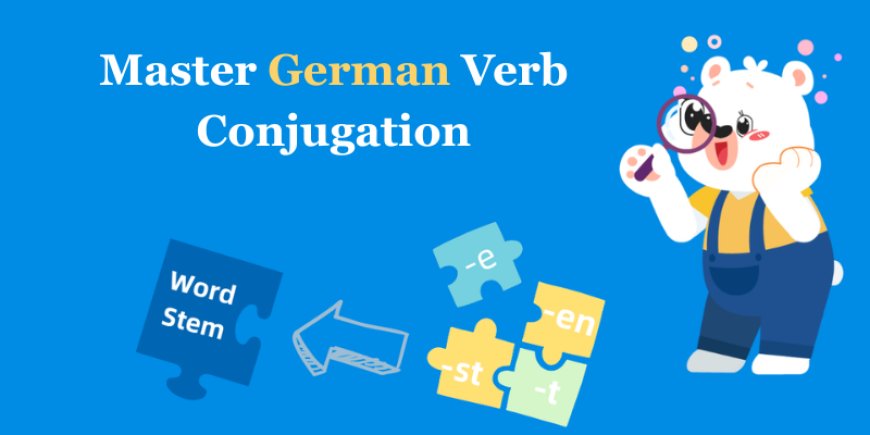How to Master German Verb Conjugation Without Stress?
Master German verb conjugation with simple tips, clear rules, and stress-free methods to boost fluency and grammar confidence.

If you've started learning German and the idea of verb conjugation makes you want to shut your books, you're definitely not alone. German is a structured language, and while that sounds intimidating, it's actually a huge advantage once you crack the code. The trick lies in comprehending how it works and breaking it down into small, stress-free steps.
Many students enrolled in a German Language Course in Chennai often find verb conjugation daunting in the beginning. But with the right approach, it can turn from a headache into a satisfying, almost puzzle-like experience.
Lets explore how you can master German verb conjugation rules without overloading your brain and maybe even have a little fun doing it.
Why Conjugation Feels Hard at First (But Doesnt Stay That Way)
One of the primary reasons learners struggle with verb conjugation is because it's very different from English. In English, most verbs barely change. But in German, every subject (like "I", "you", or "they") requires its own specific verb ending.
Now, before you roll your eyes and think, Another list of confusing rules!, take a breath. Here's the good news: once you understand a few basic German conjugation rules, it becomes second nature.
How Conjugation Works in Simple Terms
German verbs in their original, dictionary form usually end in -en. For example: machen (to do), spielen (to play), or lernen (to learn). To conjugate these verbs, you remove the -en and add various endings depending on the subject.
Lets say youre using the verb lernen (to learn). Youll change the ending depending on whos doing the action. For example:
-
If I am learning, it becomes ich lerne.
-
If you are learning, its du lernst.
-
If he or she is learning, you say er/sie lernt.
And so on.
These changes may seem minor, but they matter a great deal. And once you've practised a few, youll see that German verb endings follow consistent patterns, especially with regular verbs.
Dealing with Irregular Verbs (The Rule-Benders)
Just like English has "go" turning into "went", German has its own set of verbs that like to bend the rules. These are called irregular verbs.
Take the verb sehen (to see), for instance. When you conjugate it, the middle vowel changes in certain forms. Youll say ich sehe for "I see", but du siehst for "you see", and er sieht for "he sees".
At first glance, this might seem like bad news. But trust me, there aren't that many of these, and once you learn the most common irregular verbs, youll spot their patterns quickly. Many students taking IELTS Coaching in Chennai find that German irregular verbs actually help them understand irregular structures in English too!
How to Learn German Verb Conjugation Without Getting Overwhelmed
Heres where we make things easier. These five methods are simple, practical, and proven to work even if you're just getting started.
1. Focus on Pronouns First
Its impossible to conjugate anything if you dont know your subject pronouns (I, you, he, we, etc.). Make sure you're solid on these, because the verb ending depends entirely on them. Once youve nailed that part, conjugation becomes much easier.
2. Stick to Regular Verbs in the Beginning
Dont jump into irregular verbs too soon. Regular verbs all follow the same pattern, and that repetition is gold. Practice with common ones like spielen (to play), lernen (to learn), and machen (to do). Its a great way to build confidence.
3. Create Simple Sentences Daily
Dont just memorize forms use them. Start writing one or two sentences each day using new verbs you've learned. Try Ich spiele Fuball or Du machst Hausaufgaben. This kind of daily repetition makes a huge difference in mastering how to conjugate verbs in German.
If you're also taking Spoken English Classes Chennai, apply the same strategy. Regular speaking practice in any language improves memory retention and fluency over time.
4. Practice Out Loud
German sounds very different from English, especially when you're pronouncing those verb endings. Dont just read your verbs, say them. It might feel awkward at first, but its one of the best ways to internalize the correct forms.
Understanding the Patterns: 150 Words on German Verb Conjugation Rules
German verbs are wonderfully predictablemost of the time. Regular verbs follow a consistent pattern: chop off the -en at the end of the verb and add the proper ending based on the subject. This rule applies to verbs like lernen, spielen, and sagen. For example, ich lerne (I learn), du spielst (you play), wir sagen (we say). These German conjugation rules dont change unless you're dealing with irregular verbs, which often involve vowel shifts like sehen becoming siehst or fahren becoming fhrst.
Wrapping It All Up (Without the Stress)
German verb conjugation doesnt have to be painful. With the right strategy, starting with regular verbs, practicing every day, and focusing on pronouns, you can get the hang of it without frustration.
The real key is consistency. Little by little, your brain will start to recognize patterns, and what once felt overwhelming will become automatic.
And if youre someone who thrives with structure and live support, enrolling in Language Classes in Chennai can give you that boost. Guided lessons, native-speaker audio, and interactive grammar games can make an important difference in maintaining your motivation.
So breathe easy, grab your notebook, and start conjugating! You've got this.







































